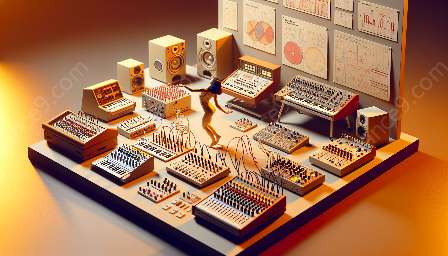Creating electronic music for dance performances involves a set of ethical considerations that play a crucial role in the dance industry. From cultural appropriation to artistic representation, these considerations shape the impact of music production on dance performances.
Understanding Cultural Appropriation
One of the primary ethical concerns in electronic music production for dance performances is the issue of cultural appropriation. Modern electronic music often draws inspiration from various cultural traditions and experiences. However, when this inspiration is insensitively appropriated without proper understanding or acknowledgment, it can result in misrepresentation and harm to the cultures from which the music originated.
Producers and musicians need to be mindful of the cultural significance of the sounds and rhythms they use in their electronic music, especially if they are drawing from historically marginalized communities. Respecting the origins of these musical elements and collaborating with artists from those cultures helps to ensure that the music production process is ethical and respectful.
Authentic Representation of Dance Styles
Electronic music is often closely intertwined with dance, particularly in the context of dance performances. When producers create music for specific dance styles, it's essential to understand and accurately represent the cultural and historical context of those styles. This means avoiding stereotypes and clichés and embracing a more authentic and respectful approach to the representation of dance in electronic music.
Responsible music production involves engaging with the communities and practitioners of various dance styles to gain insight into the nuanced aspects of their traditions. By collaborating with dancers and choreographers, music producers can ensure that their compositions authentically complement and elevate the dance performances, rather than perpetuating misconceptions or misinterpretations.
Respecting Intellectual Property and Fair Compensation
Another critical ethical consideration in electronic music production for dance performances is the respect for intellectual property and fair compensation. Samples, loops, and other audio elements are often used in electronic music production, and it's essential for producers to obtain permission for the use of copyrighted material or ensure that they are using royalty-free and cleared samples.
Furthermore, in the context of dance performances, fair compensation for the use of music is imperative. Dancers and choreographers invest significant time and effort in creating performances that are enhanced by the music, and it's essential for producers to recognize and compensate them fairly for their contribution to the overall artistic experience.
Environmental and Social Impact
While electronic music production for dance performances primarily focuses on artistic and creative elements, ethical considerations also extend to environmental and social impact. The use of electronic equipment, energy consumption, and sustainability practices in music production can impact the environment. Producers and artists should strive to minimize their carbon footprint and adopt eco-friendly practices to ensure that their creative endeavors are environmentally responsible.
Furthermore, social impact considerations encompass issues such as diversity, inclusion, and representation within the electronic music and dance industries. Producers have a responsibility to promote inclusion and diversity in their work, supporting artists from diverse backgrounds and ensuring that their music production contributes to the creation of an equitable and inclusive dance environment.
Conclusion
Electronic music production for dance performances involves navigating a complex landscape of ethical considerations. By understanding and addressing these considerations, producers can contribute to the creation of a more respectful, inclusive, and culturally sensitive dance industry. Through collaboration, cultural awareness, and a commitment to ethical practices, electronic music production can elevate dance performances while honoring the diverse traditions and communities from which it draws inspiration.






























